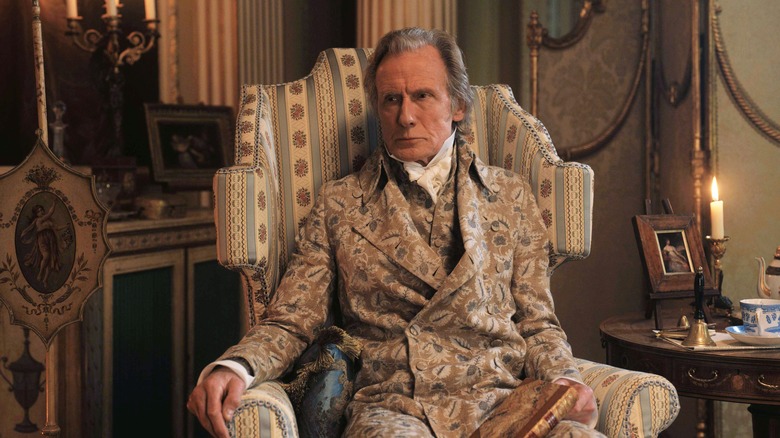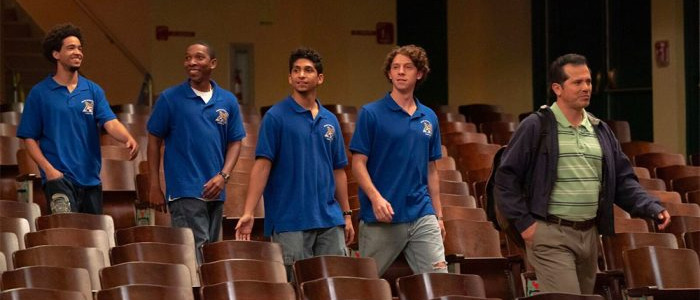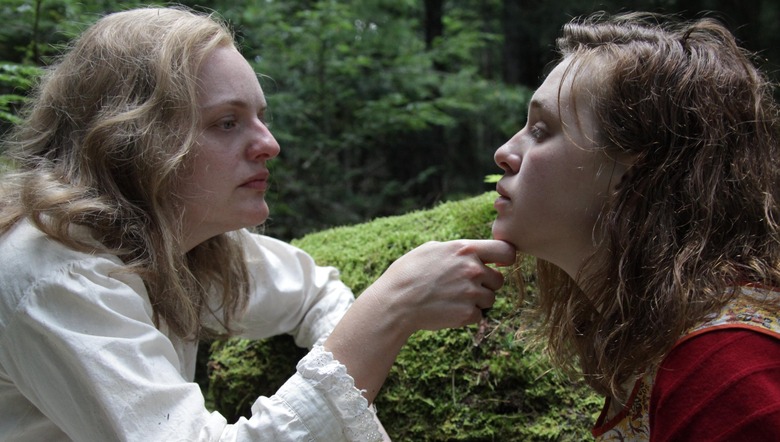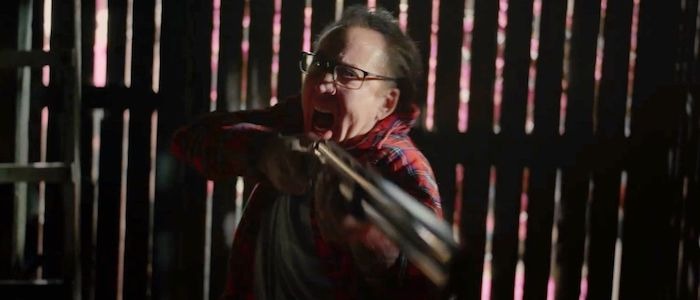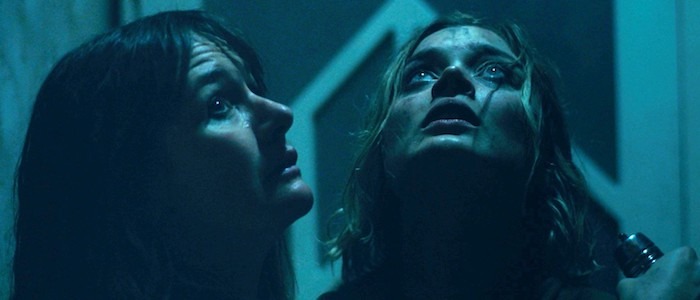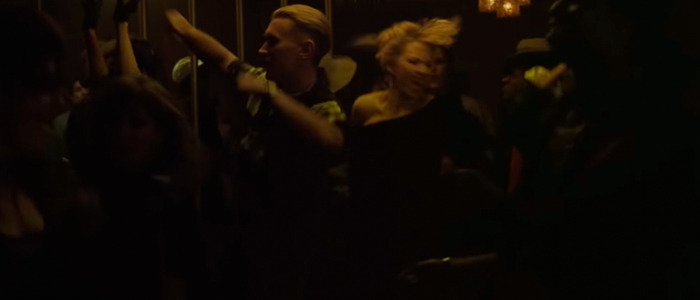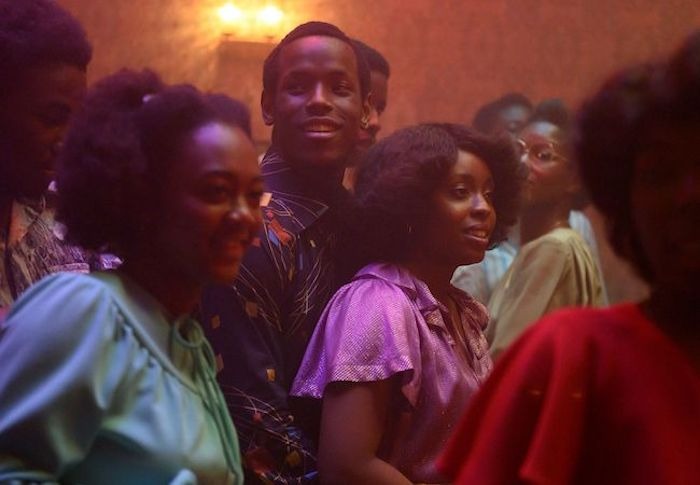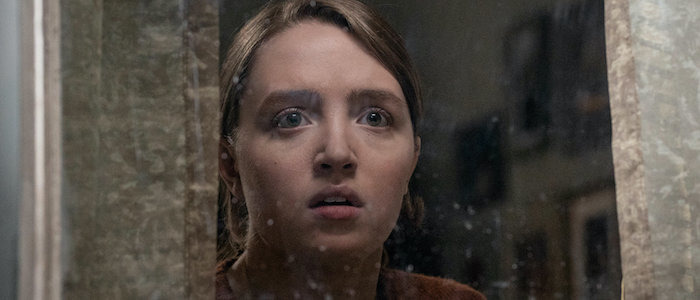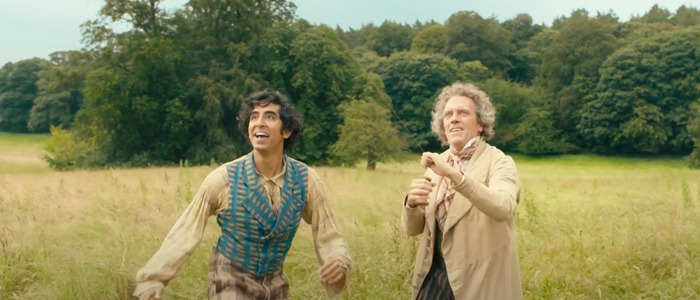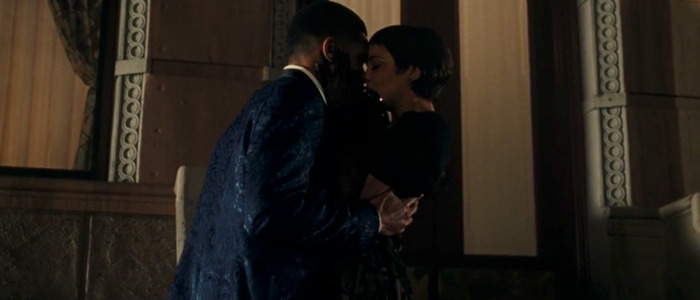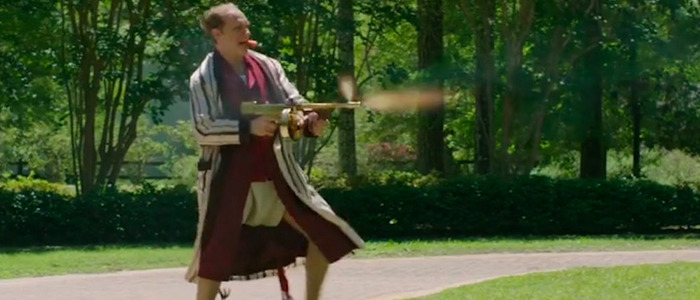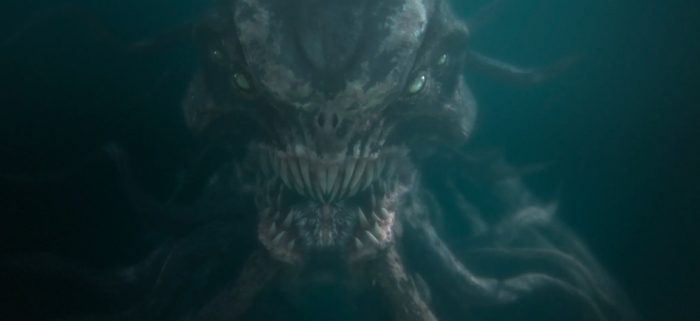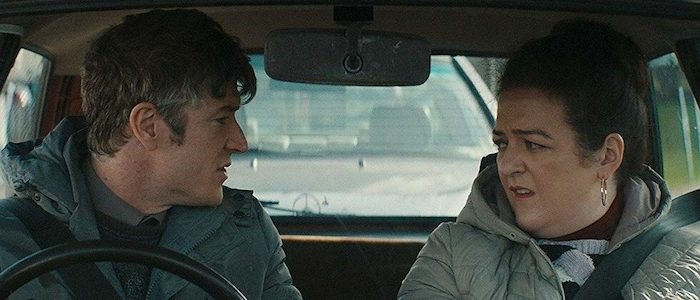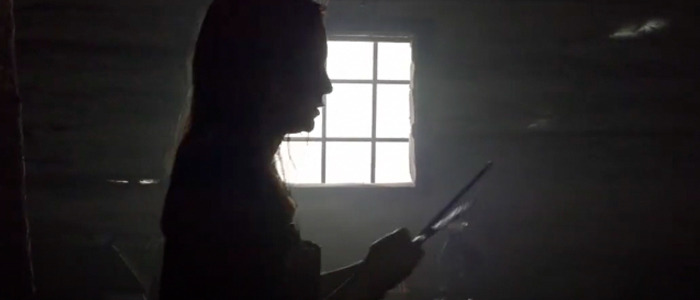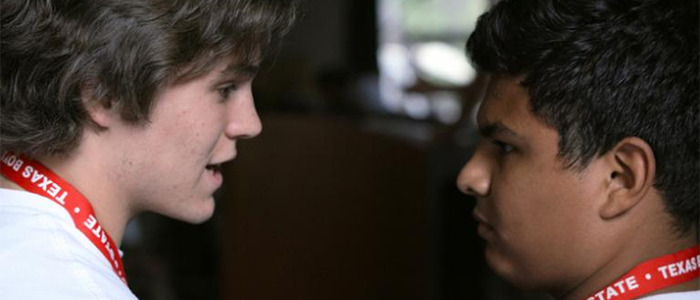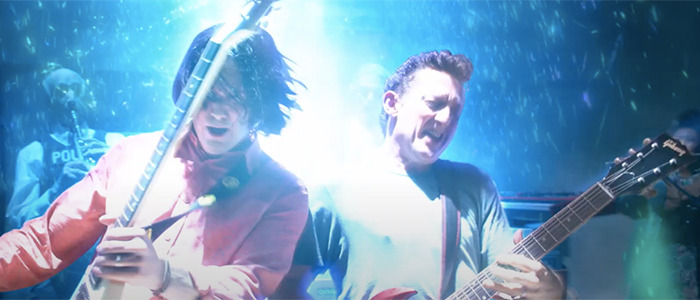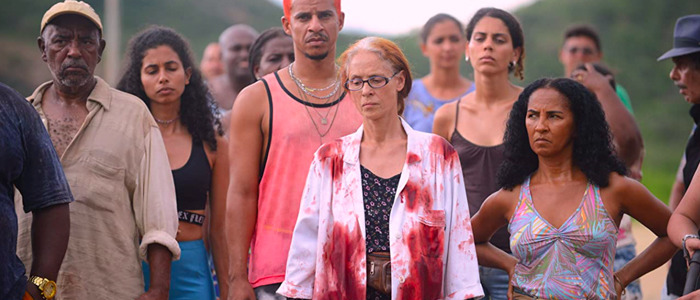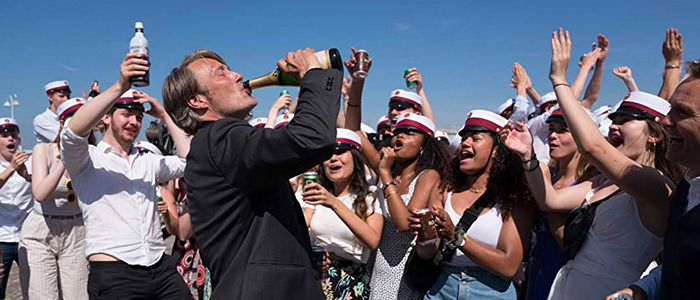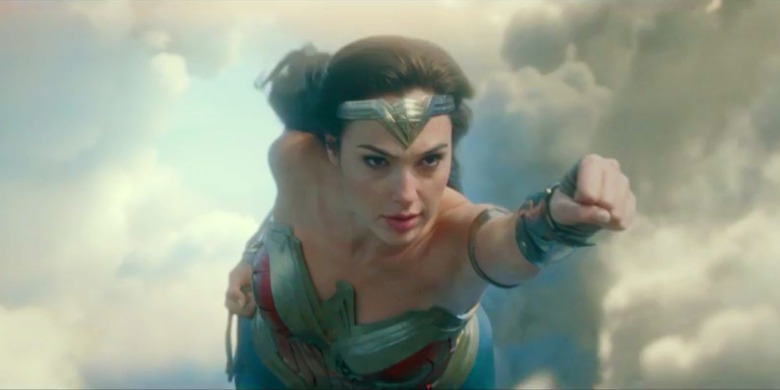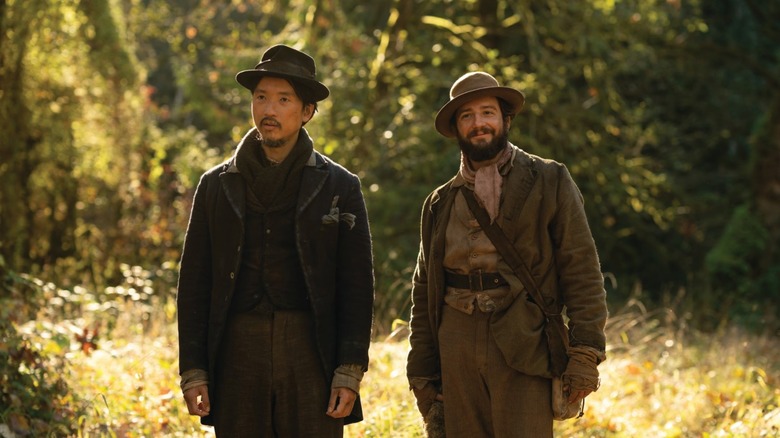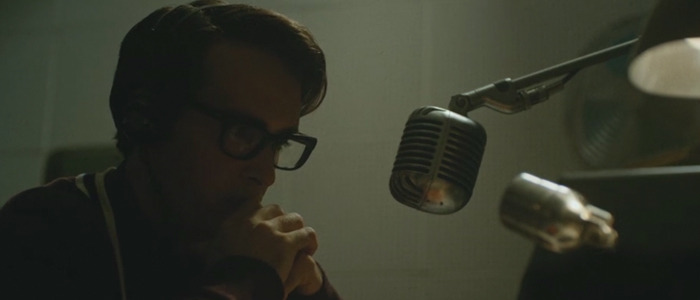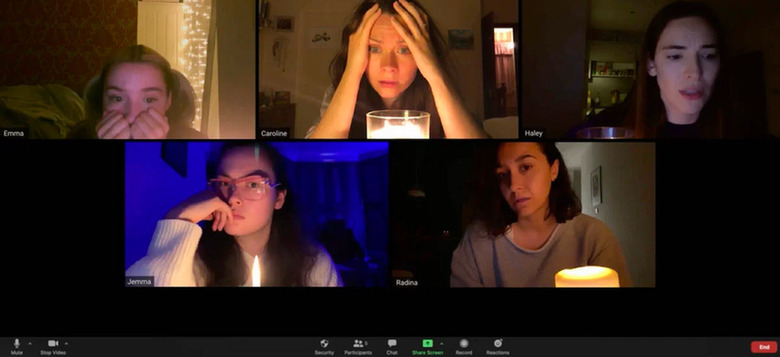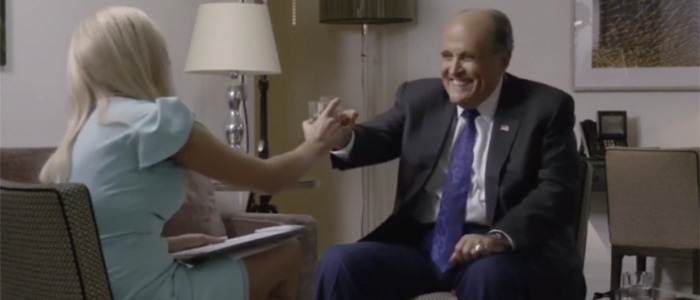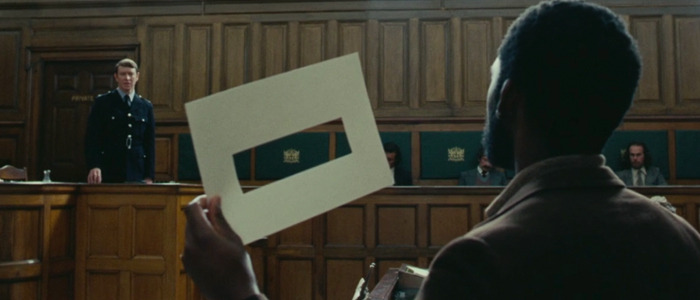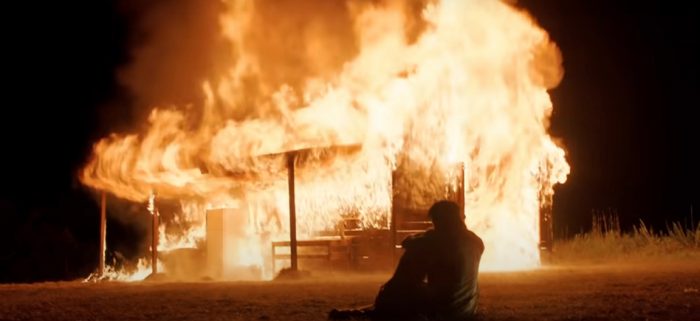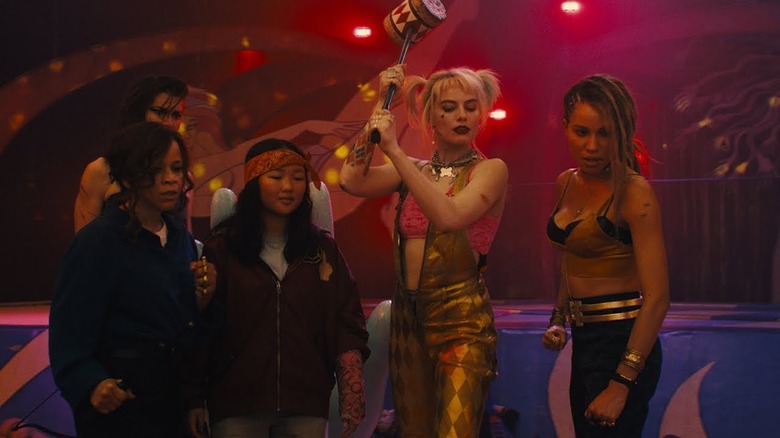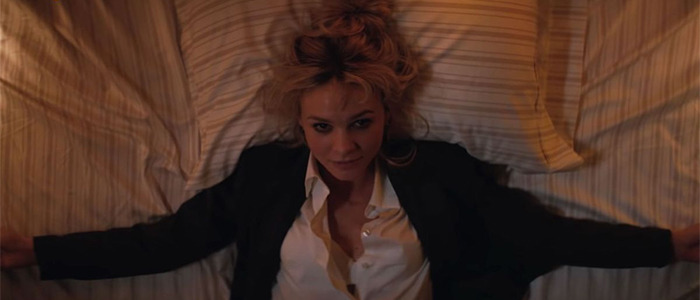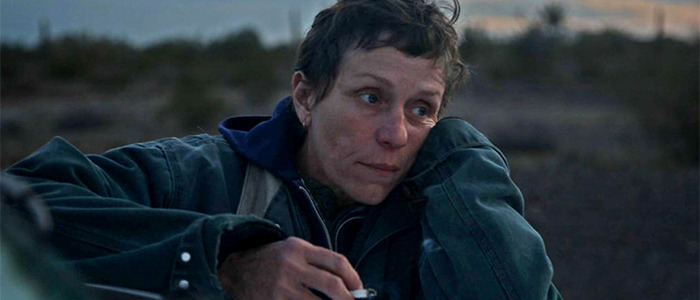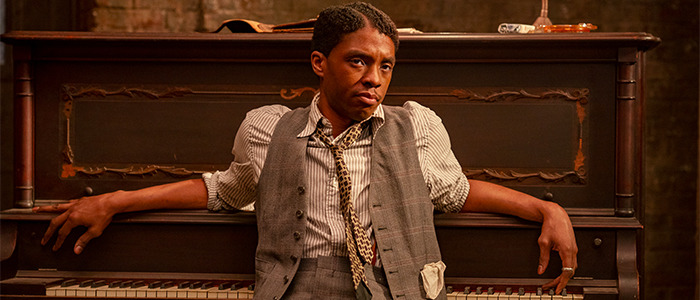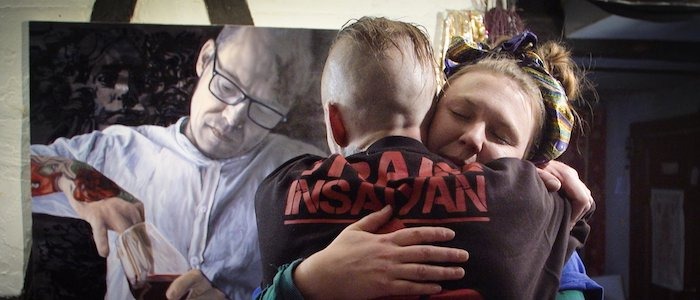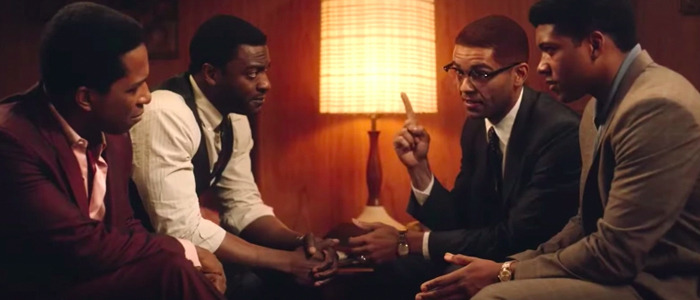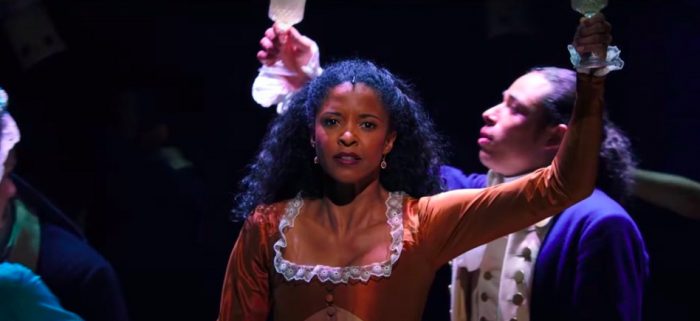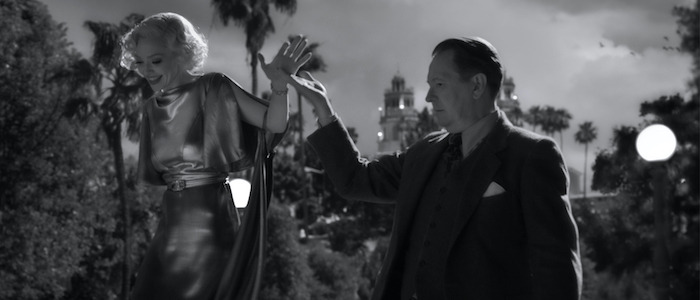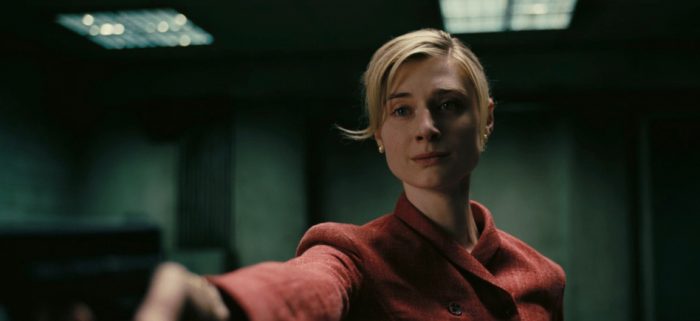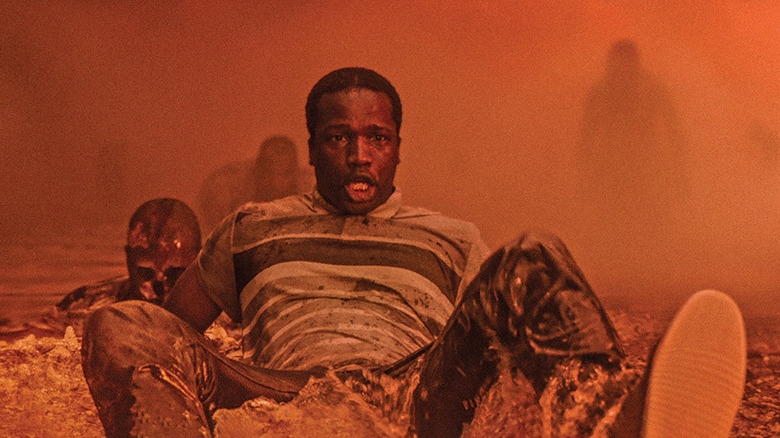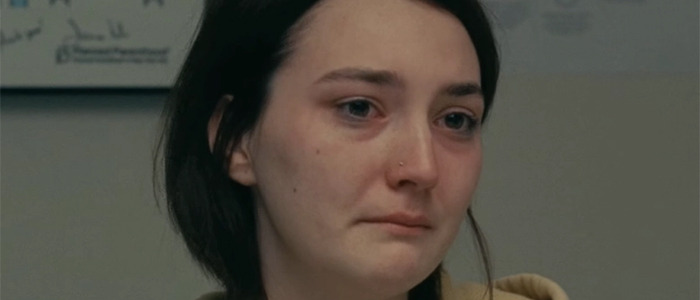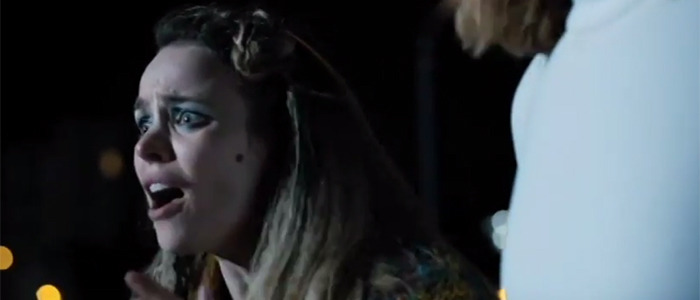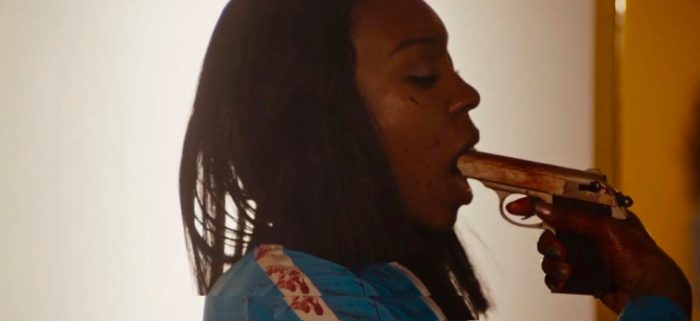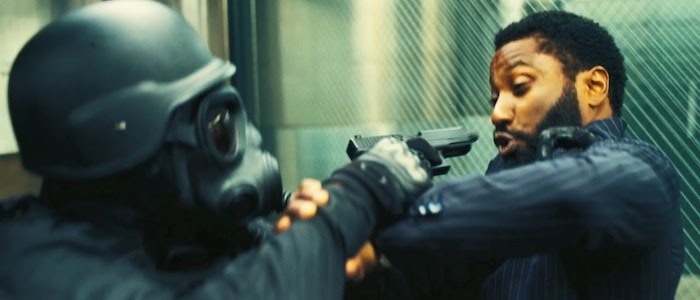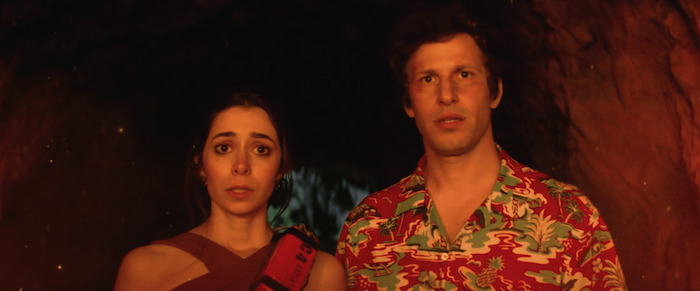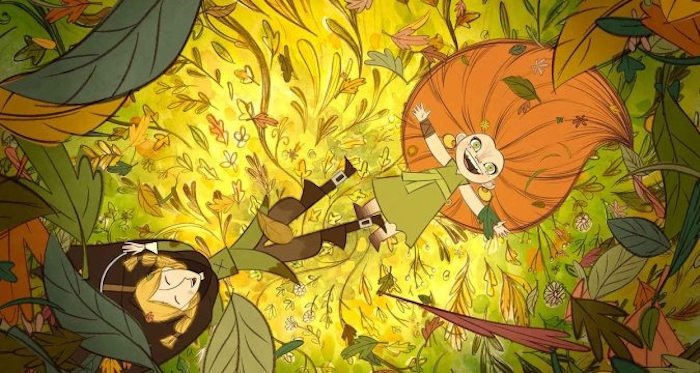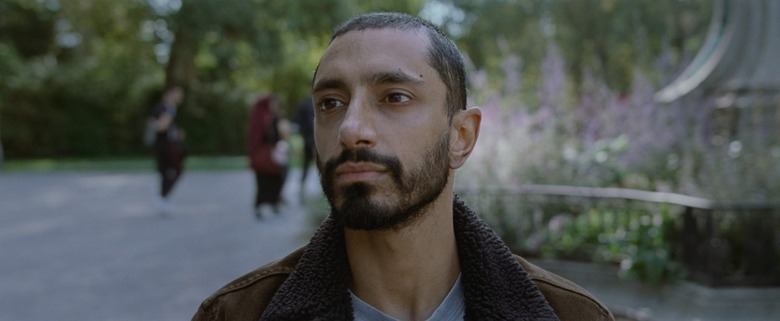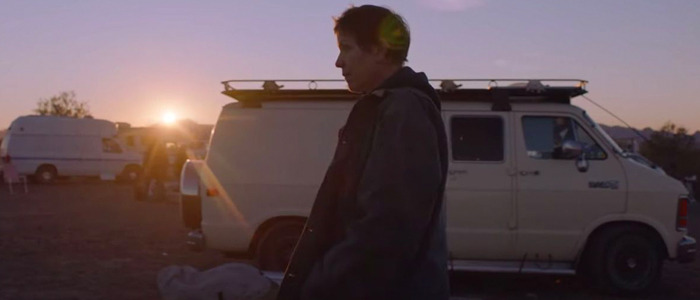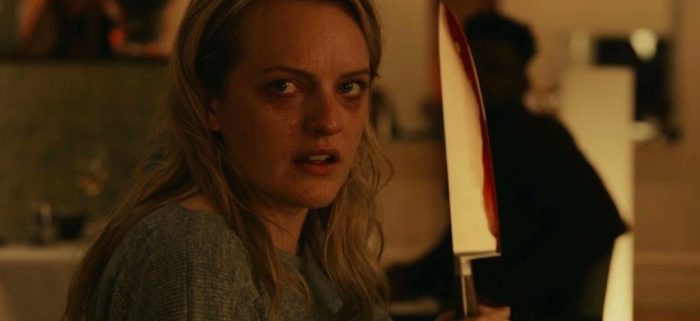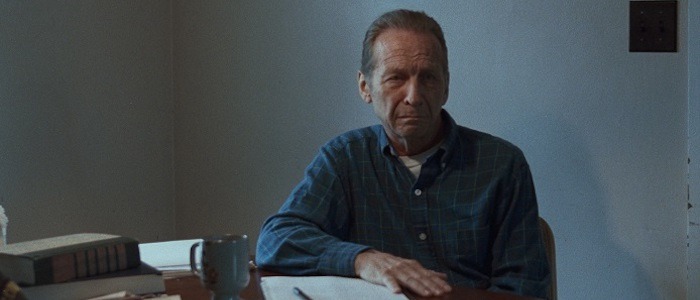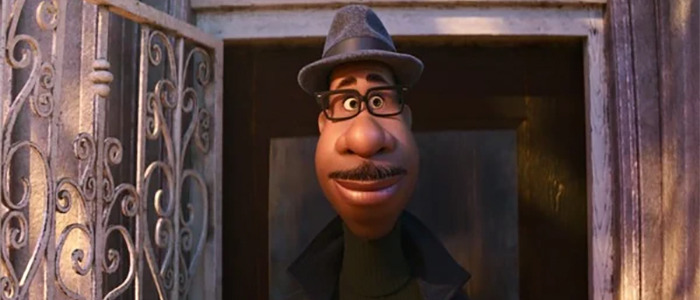The 50 Greatest Movie Moments Of 2020
Every year, the /Film team gathers to do what all websites must: make a big list about the previous year in cinema. And while 2020 offered its fair share of numbing, painful roadblocks, the movies were as good as ever, even as we watched them at home instead of at a movie theater. So compiling a list of the 50 Greatest Movie Moments of 2020 was hard not because there weren't any great moments, but because there were so many.
Here are our favorite moments – shots, scenes, lines of dialogue, gags, asides, action scenes, you name it – from the movies of 2020.
Note: This list began with 191 nominated moments, which was cut down over the course of a lengthy discussion/debate. That conversation was recorded and published as a two-part podcast, which you can listen to here and here. So if you wonder why a certain moment isn't on this list...well, you'll find your answer by listening to those podcasts! Once we had the final 50 scenes, the staff voted on the order, resulting in the final list.
This list contains major spoilers for many movies. If you haven't seen a movie, this is your warning to skim past its entry.
50. A Drafty Proposal in Emma.
Few have nailed Jane Austen's satirical wit as well as Autumn de Wilde in her feature directorial debut Emma., and it's no better exemplified than in one of the final scenes of the film, when Emma Woodhouse (Anya Taylor-Joy) and Mr. Knightley (Johnny Flynn) have finally put to rest all misgivings and miscommunications. They sit in knowing silence with each other in the living room of Emma's house, exchanging glances over books, until Emma's father (a scene-stealing Bill Nighy) notices something is off: there's a draft in the house! Mr. Woodhouse's long battle with his drafty house is one of the best recurring gags in the film, and it culminates in this wryly funny scene, in which Mr. Woodhouse (perhaps knowingly) orders his frantic servants to place screens all around them, affording Emma and Mr. Knightley privacy and allowing Mr. Woodhouse just a few minutes of protection from that blasted wind. That is, until just after Mr. Knightley makes his tender proposal to Emma, when Mr. Woodhouse asks them if they still feel a draft. It's this kind of funny undercutting of the intense, emotional scenes that make Emma. such a delight. (Hoai-Tran Bui)
49. A Surprising Death in Critical Thinking
Though there are plenty of movies about teens trying to escape the dangers of their crime-filled, inner-city neighborhoods, none of them pull the rug out from under you in the way that Critical Thinking does. The film gives you the expected set-up about a troubled kid who suddenly takes an interest in the school chess club after being sent there for detention. After swiping a chess board and pieces from class, this seems like the start of a new passion. But this kid bumps into the wrong person on the street, ends up in a tense confrontation, and is shot point blank in the head. It's a grim start to the story of a chess team who unexpectedly rises in the state rankings, and one that reminds you things can take a fatal turn for these kids at any minute. (Ethan Anderton)
48. Shirley and Rose Stand on the Cliff in Shirley
What better way to illustrate a story of women on the verge than to show our two unhinged heroines, the tortured author Shirley Jackson (Elisabeth Moss) and her ingenue/victim Rose (Odessa Young), literally standing on the edge of a cliff? The author had been building up a parasocial relationship with the housewife-to-be throughout Shirley, leeching off Rose while at the same time opening up the younger woman's eyes to a sort of twisted female liberation. Shirley herself had been dancing dangerously on the edge of sanity for the entirety of her novel-writing process, but now it's Rose's turn — having been abandoned by Shirley and discovering her husband's infidelity — to stare down the edge of the cliff. Ironically, it would be Shirley who would talk her back from the edge, after the two of them look down the steep incline together, pausing for a just a moment to consider the sweet release it would offer. (Hoai-Tran Bui)
47. Nicolas Cage Screams About the Alpacas in Color Out of Space
Color Out of Space isn't subtle. Director Richard Stanley's (loose) adaptation of H.P. Lovecraft's terrifying short story – about an unexplainable alien entity poisoning a small farm and the family that lives there – is often entertaining, frequently creepy, and always (always!) ready to fly off the rails. Case in point: Nicolas Cage's lead performance as the family patriarch, who is convinced that his alpaca farm is going to be his ticket to success ("They're the animal of the future," he insists). And because Stanley clearly had no desire to ever tell Cage to tone it down, the world's weirdest movie star goes full ham, ranting and raving about alpacas in increasingly deranged moments that feel ready to be ripped to YouTube and shared all over the internet by the actor's acolytes. It all climaxes with the alpacas themselves being corrupted into mutant monstrosities that Cage must kill with a shotgun, but that scene pales in comparison to Cage's gonzo performance up to that point. (Jacob Hall)
46. Lost in the Crawlspace in Relic
In Natalie Erika James' Relic, the dementia being suffered by an ailing grandmother becomes a literal malevolent force, threatening to consume her daughter and granddaughter. While the film functions just fine as supernatural tale of terror, a haunted house movie with a unique twist, it's the final act that directly connects the wounded emotions of the characters with the horror set pieces. The characters find themselves trapped in a crawlspace that never ends, an impossible labyrinth that simply cannot exist inside this house. And they're not alone. Something is hunting them. It's a terrifying sequence, one of the most frightening moments of 2020. But it's chilling on a deeper level too: this is what it's like to lose your memories and your sense of self, to be continuously afraid as your entire world breaks around you and the familiar becomes alien. It's horror in service of empathy – an internal terror becomes external. (Jacob Hall)
45. Allison Dances in The Nest
Roy O'Hara (Jude Law) is a liar. He's a hype man, one of those guys who uses his looks and natural charm to bulls*** his way through business deals and contracts, hanging onto his life by the barest of threads. His wife, Allison (Carrie Coon), can't stand it anymore, and after a fancy dinner at which Roy tells some particularly galling lies in order to boost his social standing, the facade crumbles. She dresses him down in front of his colleagues and leaves him stranded at the restaurant, going by herself to a club and drinking and dancing the night away. For that brief moment, all of her responsibilities and the weight of keeping her family afloat and united fade away, and she's finally able to have one blissful night to herself. On that dance floor, nothing else matters. (Ben Pearson)
44. The “Silly Games” Scene in Lovers Rock
Watching Steve McQueen's sensual Small Axe entry is like grooving to an hour-long jam session, a transporting experience that ebbs and flows with the reggae music that acts as the swooning soundtrack to the film. But the standout moment of the film is oddly one where the music stops for one ecstatic moment, in a house-wide singalong of Janet Kay's 1979 single "Silly Games." It's as if time stops for a moment here, the entire house suspended in the euphoric joy of this shared experience, the radiant beaming expressions of the singers and dancers showing as they sway to their own off-key singing. It's a singular moment in cinema in 2020, and honestly, of the past few years. (Hoai-Tran Bui)
43. The Rooftop Escape in Run
Run is a film with many familiar pieces, but each of those pieces is utilized in razor-sharp fashion. About halfway through Aneesh Chaganty's wily thriller, Chloe (Kiera Allen) finds herself locked in her upstairs bedroom by her deranged mother. The only way out is to climb through the window and traverse the rooftop to another window...which is easier said than done, since Chloe uses a wheelchair. In a film filled with smart characters making intelligent choices in the face of dangerous, hostile situations, this is the clear highlight. We watch as Chloe thinks through her predicament and conjures a painful solution that tests her body and mind in equal measure. It's made all the more wild to witness because Allen uses a wheelchair in real life and truly sells the physicality of her escape. (Jacob Hall)
42. Flying a Kite in The Personal History of David Copperfield
There are so many scenes in Armando Ianucci's The Personal History of David Copperfield that capture its particular candy-colored brand of whimsy, but the kite-flying scene is the first I remember that put a wide, beaming smile on my face. David Copperfield (Dev Patel) has met a kind of kindred spirit in Hugh Laurie's eccentric Mr. Dick, a former lawyer who believes that the thoughts of King Charles' decapitated head are flooding his mind. Just like David, Mr. Dick is so overwhelmed with words that he writes them all down on scraps of paper, but his mind remains muddled. David comes up with the genius idea: they'll attach the paper to a kite and fly it outside, letting the wind take the words out of Mr. Dick's head. The pair of them barrel through Betsey Trotwood's living room, kite in hand, throwing it into the sky in a smooth joyful motion. It's a wonderfully whimsical moment that can only exist in Dickens and Ianucci's heightened reality, because wouldn't it be so nice if we could all so easily cast our worries out to the wind? (Hoai-Tran Bui)
41. The First Kiss in Sylvie’s Love
Aspiring TV producer Sylvie (Tessa Thompson) is engaged, and her fiancé is overseas fighting in the Korean War. But the chemistry she has back in New York City with jazz musician Robert (Nnamdi Ashomuga) is undeniable, and after a few smoldering interactions and a date to see Robert play the saxophone on stage, excitement builds as the two walk up to Sylvie's stoop at the end of the night. After some back and forth about what constitutes a "date," the dam finally breaks and the two lock lips for the first time, going back for more in a way that feels a little cutesy but also true to life. It's the type of swooning, overly romanticized moment you've seen a million times on film – but then you realize this is one of the few times you've ever seen Black characters in the lead roles in a period setting like this. (Ben Pearson)
40. Al Capone Murders People With a Golden Tommy Gun While Chomping on a Carrot and Wearing an Adult Diaper in Capone
In Josh Trank's Capone, the most memorable of the aging former gangster's many syphilitic hallucinations comes late in the film, when Al Capone (Tom Hardy) wanders across the grounds of his Florida estate wearing a robe, an adult diaper, and carrying a gold-plated tommy gun. He silently guns down his own family members, shooting them in the back and blasting through the windows of his massive mansion, which he's come to view as a prison. It's the only flicker this movie offers of the Capone persona we expect from all of his gangster antics, but Trank isn't interested in that narrative. The film seems to be a metaphor for his own career (Capone literally s***s himself multiple times), and you have to wonder if this hallucination is Trank working through instances when he may have lashed out at people close to him. Oh, and did I mention Capone carries out this massacre while chomping on a carrot like a deranged Bugs Bunny? (Ben Pearson)
39. The Giant Monster Finally Appears in Underwater
Underwater is a nifty deep-sea monster movie that more people need to watch. Sure, it's not very original, but that doesn't make it any less enjoyable. The film deals with a group of people trapped at a research and drilling facility at the bottom of the Mariana Trench. The facility is collapsing, so our characters have to escape, but that's easier said than done because there are sea monsters lurking everywhere. The monsters are human-sized and mostly glimpsed in quick, fleeting jump-scare moments. But it's all building towards a big reveal, and I mean big: the smaller monsters are being spawned by a gigantic, Cthulhu-like creature. The reveal of the monster is wonderfully staged – you get a true sense of how massive and scary it would be to suddenly spot this thing in the dark depths. (Chris Evangelista)
38. Rose Loses Her Virginity in Extra Ordinary
Extra Ordinary is a film destined for cult status, especially when more people learn about its outrageous climax. This low-key Irish rom-com follows the middle-aged Rose, whose ability to speak to ghosts has has made her a self-doubting pariah. However, her neighbor Martin comes to her when his teenage daughter is abducted to be used in a Satanic ritual that requires a virgin sacrifice, leading to an unlikely romance as they play supernatural detectives. In the end, the newly summoned giant portal to Hell rejects Martin's daughter – she's no virgin! But the demon that emerges from the fiery pit sees a virgin in the room: Rose. As the forces of hell pull Rose across the floor toward an unholy demise, Martin scrambles to climb on top of his newfound love and ensure that she is, uh, no longer a virgin before she is sent to eternal damnation. Consummations of cinematic love do not get wilder or more memorable than this. (Jacob Hall)
37. The Ending of Hunter Hunter
After spending 95% of its run time as a survival thriller about a family battling an encroaching wolf, Hunter Hunter takes a sharp turn into a full-blown revenge horror flick in its last few minutes. When family matriarch Anne (Camille Sullivan) realizes that her husband (Devon Sawa) has been killed by the man (Nick Stahl) she helped nurse back to health, and that the killer is now alone in a house with her young daughter, Anne races back to the cabin – only for her worst fears to be confirmed. With nothing else to live for, Anne gets the upper hand and calmly begins skinning him alive, using the survival techniques she learned earlier in the film. One of the last shots reveals the extent of her handiwork: a stomach-churning mess of nerves and tendons whose skin – and face – has been completely removed from his body, leaving only a roving eye. The movie goes from a slow burn to standing on the surface of the sun in the span of about 30 seconds, and results in some of the most upsetting cinematic imagery of the century so far. (Ben Pearson)
36. Robert’s Speech...and Then Steven’s Speech in Boys State
Boys State is a documentary that follows a mock student government navigating the challenges of organizing political parties, creating consensus for legislation, and campaigning for various positions in state and city government. In our current political climate, it comes as no surprise that despite being split into Federalists and Nationalists, the politics come down to Demoratic and Republican ideals, and it's clear which party each of the two key teen governor candidates identify with. In the governor race, Steven Garza (right) is campaigning for the Nationalists and Robert MacDougal (left) is one of the Federalists in the running. During the campaign process, Robert gives such a hollow, manipulative, and purely political speech while Steven speaks from the heart with integrity without any mudslinging, and it's clear which of these young men has the potential to be a true leader and which is just an opportunistic politician. It's supremely frustrating and rather encouraging all at once. (Ethan Anderton)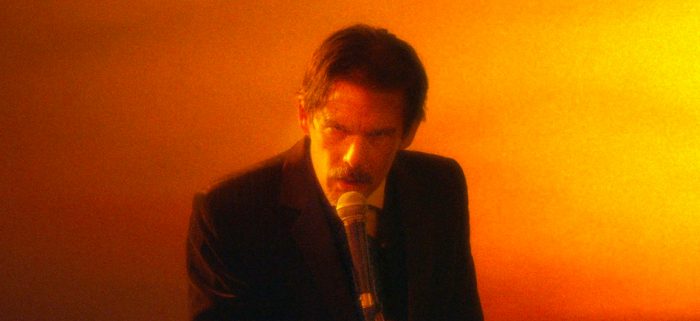
35. Nikola Tesla Sings Karaoke in Tesla
Telsa is not your standard biopic, and when I'm trying to sell people on this fact, I always bring up one thing: a scene where Nikola Tesla sings karaoke. Needless to say, the real Tesla didn't go out and perform karaoke, but in Michael Almereyda's unique portrait of the inventor, Ethan Hawke's Tesla does just that. He performs a rendition of the Tears for Fears song "Everybody Wants To Rule The World" in one of several wonderfully strange and anachronistic moments. It's so strange and wonderful that you can't help but smile – and it almost didn't happen. "That was a last-minute addition. And a reckless one, because we didn't have the rights to the song," Almereyda said. "And we had to fight and beg for it. We were toward the end of the shoot, and we both (Ethan and I) realized there may be a way to be a little more daring and a little bit more fun. And then I mentioned that sometimes shy or sensitive people reveal themselves when they are doing a karaoke song. So, I came up with the song idea and Ethan embraced it. It wasn't just that the lyrics had some resonance, but it was also an upbeat song, and the movie would kind of crystalize at this point." (Chris Evangelista)
34. The Final Concert in Bill and Ted Face the Music
In one of the most purely uplifting endings in cinema this year, we see William "Bill" S. Preston Esq. (Alex Winter) and Ted "Theodore" Logan (Keanu Reeves) teaming up with their daughters Billie (Brigette Lundy-Paine) and Thea (Samara Weaving) and the rest of the world (even Death himself!) to play a concert that saves the universe. After creating infinite copies of themselves, Bill and Ted get instruments into everyone's hands around the world, and they all perform the catchy song, produced by their daughters, to bring everyone together. It's such an earnest, inspiring, infinitely cheesy conclusion for such a silly comedy, but that's what makes it most excellent. (Ethan Anderton)
33. The Town Fights Back in Bacurau
After putting up with a water shortage, their town literally disappearing from maps, and a corrupt mayor, the people of the small town of Bacurau have had enough. When a small group of armed white people invade, murder a young child, and try to pick off the townsfolk one by one, the indigenous citizens defend themselves by using weapons from their town museum, literally utilizing the power of their collective past to rise up against forces who blithely underestimated them. This climactic moment is a bloody but apt metaphor for the power of community, as well as a warning to treasonous politicians that feels more vital than ever in light of recent events in the U.S. (Ben Pearson)
32. The Ending of Another Round
For much of its runtime, Another Round alternates between jubilant and melancholy tones as its middle-aged protagonists repeatedly get drunk and subsequently deal with the fallout of their actions. The ending contains the movie's best moment: Mads Mikkelsen's teacher character, a former dancer who had previously been encouraged to dance by his friends, encounters a big party of his former students celebrating their graduation at a harbor and finally lets loose, gracefully dancing his way through their party and commanding the screen like never before. It's a wonderfully physical moment for Mikkelsen as a performer and a cathartic release for the character, and the final freeze frame as he leaps into the water leaves the movie on a bit of an ambiguous note. Is he finally going to be OK? Or does that final jump represent the beginning of another downward spiral? (Ben Pearson)
31. Diana Takes Flight in Wonder Woman 1984
Flight was the gift that Diana (Gal Gadot) most equated with Steve Trevor (Chris Pine), her long-lost love miraculously returned to her in Wonder Woman 1984, and one that she most envied of him, she confesses during their flight to Cairo. "I'll never understand it," Diana confesses. "It's so easy, really," Steve replies, thoughtfully. "It's wind and air and knowing how to ride it, how to catch it. How to join with it." When Diana must lose Steve a second time in order to regain her powers from the Dreamstone, she lassoes a passing jet plane (another very cool moment) and there among the clouds, she finds that Steve's advice is true: she can fly. But it's a bittersweet newfound ability, as Diana revels in her ability to surf through the air while mourning the final "gift" that Steve has left her with. It's a scene that feels true to the Richard Donner-level awe that Wonder Woman 1984 emulates, especially in Diana's final Superman-like pose as she flies toward her final battle. (Hoai-Tran Bui)
30. Selling Oily Cakes in First Cow
Kelly Reichardt's tender frontier fable is an unlikely story about two guys who just want to start a baking business together. It's an odd premise for a film that takes place on the wild western frontier, so it could not be better exemplified than in the strange scene of the two men, the softspoken baker Cookie (John Magarod) and the shrewd Chinese immigrant King Lu (Orion Lee), selling their wares for the first time in one swampy, grey corner of the settlement market. With only a bowl full of batter and a small pot of oil, Cookie does his best to replicate the gourmet bakery experience with his "oily cakes" — even drizzling a little honey on them — to the wonder of the grizzled men who quickly crowd around them for a taste of "home." Seeing the hardened looks of the settlers soften into faces of joy as they bite into the cakes is almost as wonderful a treat as those oily cakes look to be. (Hoai-Tran Bui)
29. Billy’s Phone Call in The Vast of Night
The Vast of Night is about a small-time radio DJ and a switchboard operator who slowly realize that something's happening in the skies above their New Mexico town. Part of that realization comes through a lengthy phone call from a local listener named Billy (Bruce Davis), who calls into the show and drops some truth bombs about his time in the military which helps fill in some of the gaps of the film's central mystery. This phone call is one of the movie's most mesmerizing moments, with the characters and the audience hanging on Billy's every word as he slowly and deliberately describes his experience covering up something...otherworldly. Co-writer/director Andrew Patterson knows it's effective, too: he's so confident that he cuts to black a couple of times, letting Billy's voice be the only thing we hear. Thanks to Davis's dynamite performance and the excellent script, that's more than enough to keep us hooked. (Ben Pearson)
28. Caroline’s Death in Host
There were a number of great horror movies released in 2020, but there was only one horror movie that actually defined the year: the shot-on-Zoom Host. Rob Savage's brisk, terrifying, and surprisingly funny film is about what happens when you try to conduct a seance on a Zoom call and don't respect the rules, inviting a demonic force into several homes at once thanks to modern teleconferencing. Things go very badly for everyone involved, but it's Caroline's death that lingers the most. We see early on that she playfully uses a gif of herself as the background of her screen, so when she vanishes, we're left with only an echo. She's there, but...not there. And then she abruptly enters the frame again, her face brutally slamming into her keyboard again and again before vanishing, once more, behind that innocent gif of her former, living self. Host utilizes a number of Zoom quirks, familiar to millions after a year in lockdown, to set up brilliant scares. This the best of them. (Jacob Hall)
27. Rudy Giuliani Puts His Hand Down His Pants in Borat Subsequent Moviefilm
It was a forgone conclusion that plenty of shocking moments would come out of Borat Subsequent Moviefilm, but no one was expecting it to go this far. After Borat's teenage daughter Tutar (adult actress Maria Bakalova) has managed to quickly spark a career as a right-wing news pundit looking like any of the blonde anchors you see on Fox News everyday, she lands an interview with former New York City mayor and Donald Trump's lawyer Rudy Giuliani. What starts as a normal interview in a hotel suite turns into a flirtatious affair, and in the aftermath of the interview, Giuliani appears to be preparing himself to engage in some kind of sexual congress with this young woman, reaching down into his pants after she makes him a drink and takes off his microphone. This is the person legally representing the President of the United States, and half the country is totally cool with these events. It's repulsive and shameful, but it's undoubtedly one of the biggest movie moments of the year. (Ethan Anderton)
26. The “Observe and Report” Moment in Mangrove
In the halls of London's central criminal court, the "Mangrove Nine" find themselves on trial for inciting a riot and fighting against the police. The charges are bogus, but because the defendants are Black and live in a country in which racist cops have been able to operate with impunity, they're fighting an extremely uphill battle to clear their names. Two of the nine, Altheia Jones-LeCointe (Letitia Wright) and Darcus Howe (Malachi Kirby), opt to represent themselves, and through their own ingenuity, they're able to challenge the lead racist cop's narrative, twisting his own lying testimony against him in a moment revolving around the size of a vehicle window and how many people could look through it at one time. It's a triumphant moment and one of the biggest steps toward victory. The war still isn't over, but it's nice to win a battle every once in a while. (Ben Pearson)
25. The Farm Fire in Minari
In Lee Isaac Chung's Minari, a Korean-American family moves to Arkansas, hoping for a better life. The family patriarch, Jacob (Steven Yeun) starts growing vegetables with the intent of selling them locally, but his wife Monica (Han Ye-ri) struggles with their new situation. She doesn't like living in a trailer, and she's grown concerned that all Jacob cares about his the farm, not his family. Things come to a head with a tense series of events that leads Monica to decide she needs to take the kids and leave Jacob, because he seemingly will always choose his dreams of the farm over them. But through a mishap, the barn where much of the picked and packed produce has been stored catches fire, threatening to have the family's livelihood go up in smoke. And the married couple run into the fire. The scene is perilous, with flames licking every corner of the frame and smoke making it nearly impossible to see what's going on. And despite their arguments, and their near-separation, Jacob and Monica save each other, with Monica trying to help save the things she believes her husband holds dear, and Jacob abandoning the produce in order to save Monica. The pair have been through a trial by fire, and it's only fitting that when the smoke has cleared, they're together again, out searching for water to start over. (Chris Evangelista)
24. The Hair Tie Toss in Birds of Prey
Birds of Prey does a lot of work to show its female empowerment bonafides — from its female-led cast, to its all-female musician needle drops, to director Cathy Yan's bedazzled color scheme. But the moment that adds real-life texture and authenticity to Birds of Prey's fizzy portrait of the female experience is a blink-and-you'll-miss it exchange during the film's climactic fight scene against Roman Sionis' (Ewan McGregor) goons: Harley Quinn (Margot Robbie) tosses a hair tie to Black Canary (Jurnee Smollett-Bell), whose long tresses have gotten in her face. It's a small and intimate gesture you don't often see in a big, bombastic superhero movie, much less in the middle of a fight scene, and nod to irritating physics of long hair that many women deal with, which only a female director and writer could catch onto. (Hoai-Tran Bui)
23. Hearing Ryan’s Voice in Promising Young Woman
Promising Young Woman follows Carey Mulligan as Cassie, who works at a coffee shop by day but spends her evening striking fear into the hearts of "nice guys" who try to take advantage of incapacitated women out at the bar. She's driven by the lingering trauma of one of her best friends being raped in college and eventually killing herself, but she starts to snap out of her string of vengeance when she meets a seemingly nice guy in Ryan (Bo Burnham), a former classmate from her medical school days who asks her out. After going out one some dates and falling for Ryan, an incriminating tape of her late best friend's sexual assault reveals Ryan was actually present during this heinous deed. Though not entirely unexpected, it's a powerful gut punch that knocks the wind out of you just the same, and it's the ultimate betrayal that fuels the surprising conclusion of the movie. (Ethan Anderton)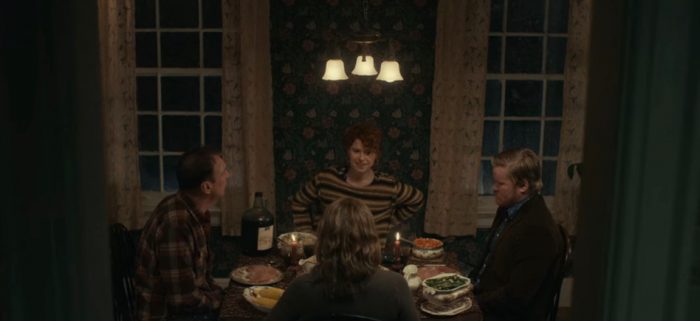
22. The Dinner in I’m Thinking of Ending Things
At this point, it's probably a good idea to not sit down at a dinner table with a character played by Toni Collette. I'm Thinking of Ending Things doesn't have Collette having the type of angry outburst at dinner as she did in Hereditary, but it doesn't mean it's an inviting moment, either. In the film, Jessie Buckley plays an unnamed narrator who travels to meet her boyfriend's parents. The entire trip is strange and surreal, and the boyfriend, Jake (Jesse Plemons), seems jittery. Things get even weirder when they finally show up at the house, and Jake's parents (Collette and David Thewlis) act...unhinged. Eventually, everyone sits down to dinner, and an attempt at conversation is made, starting off with talk of abstract paintings and then "quantum psychics" (actually quantum physics, of course). Thewlis' character seems needlessly argumentative while Collette appears to be almost on the verge of tears (when she's not uttering a strange, snorting laugh), and the entire scene knocks you completely off-kilter. As the night progresses, time seems to change within the walls of the house, as the parents get older, as if years have passed in the blink of an eye. (Chris Evangelista)
21. “I'll See You Down the Road” in Nomadland
Nomadland follows Frances McDormand as a widower from a small town struck by economic downturn who takes to a life out on the road, traveling from place-to-place in a van that has become her home, taking seasonal jobs, and spending her time with fellow nomads around bonfires. During one of these community gatherings, they pay tribute to one of their own who has passed away. While sitting around a fire, they share fond memories and thoughts about their departed friend, but one of the real-life nomads cast in the film chooses not to say goodbye. Instead, he merely says, "I'll see you down the road," knowing that one day he'll be reunited with his friend in the afterlife. It's a simple sentiment, but it's genuinely touching and heartbreaking, and it's even more meaningful knowing it's coming from this real nomad instead of just another actor. (Ethan Anderton)
20. Levee’s Backstory in Ma Rainey’s Black Bottom
Chadwick Boseman delivers a career-best performance in Ma Rainey's Black Bottom, making his untimely death last year all the more heartbreaking. While Boseman delivers an outstanding turn throughout the entire film as Ma Rainey's trumpet player Levee, there's one particular scene that is the best showcase of his work. After being chastised by his fellow bandmates for speaking to white people too eagerly and kindly in order to please them, Levee launches into his tragic childhood backstory, explaining that he was present when a gang of white men raped his mother while his father was out of town. Furthermore, after selling their 50-acre farm to some of the white men responsible for this despicable crime, his father was lynched after he returned to town and trying to exact his revenge on the rapists. If all that wasn't enough, he's left with a massive scar where the men sliced him during their assault on his mother. Boseman's monologue is intense, agonizing, and commands attention, making for a truly Oscar-worthy moment. (Ethan Anderton)
19. The First Painting is Revealed in The Painter and the Thief
The Painter and the Thief is a documentary blessed with one incredible moment after another, the kind of scenes that make you believe a cosmic force must have intervened to make sure cameras were present. And while the film astonishes until the final frame, it lets you know what you're in for within the first 20 minutes. Shortly after artist Barbora Kysilkova connects with troubled criminal Karl Bertil-Nordland, who literally stole two of her paintings off the wall of a gallery, she decides to make him her new muse. So Barbora paints him. And she invites him over to reveal the finished work. And it's gorgeous, a stunning portrait of Karl from someone who has chosen to look past his exterior and into his soul. Karl breaks down, totally overcome by not just the beauty of the work, but by the mere fact that someone has taken an interest in him, this seemingly broken and unfixable man. It's the beginning of a long, strange relationship for these two and a promise of what's to come: this will be raw and this will hurt, but you dare not look away. (Jacob Hall)
18. Malcolm X Versus Sam Cooke in One Night in Miami
With its simple setting and lengthy stretches of dialogue, it's clear that One Night in Miami began life as a stage play. But director Regina King does a great job translating that material to the screen, specifically in one sequence capturing a verbal sparring session between Malcolm X (Kingsley Ben-Adir) and Sam Cooke (Leslie Odom Jr). Malcolm rakes Sam over the coals for Sam not doing more to further the Black cause in his songs, raising interesting questions about the value of art that does not directly address oppressive societal struggles in times of need. But Sam fires right back, pointing out that much of the work he's done to further the cause has been behind the scenes, helping other Black artists thrive through his record label. It's a reminder that even in a culture in which people broadcast their lives online, we don't always have the full picture. (Ben Pearson)
17. "Satisfied" in Hamilton
Every song in Hamilton is a banger, but there's something very special about "Satisified" as performed by Renée Elise Goldsberry. Playing Angelica Schuyler, sister-in-law of Alexander Hamilton, Goldsberry belts out a song that requires her to speed through 5½-minutes of raw emotion as Angelica sings about missing her chance at true love with the founding father. Disney's filmed version of Hamilton is wildly entertaining, but let's be real: as a film, it's lacking. Save for some close-ups, the movie is a filmed version of the stage play, and it doesn't get very creative when it comes to capturing it all. In fact, the camera mostly just hangs back and lets the show unfold. And that's fine. But when it comes to "Satisfied," one of the most difficult numbers in the show, things change. Because not only are we watching this scene, we're also watching the actors on stage recreate the actions of the previous number, "Helpless." "Satisfied" goes back to show us events that happened during that previous song, which allows the filmmaking to get creative, complete with overhead shots, close-ups, and a constant sense of movement. But it's Goldberry's work that makes the entire scene a show-stopper. (Chris Evangelista)
16. Walking Through the Hearst Castle Grounds in Mank
Mank is a film obsessed with with the golden age of Hollywood, with its sins and virtues and heroes and villains. It's utterly transportive, delivering us to another time and place via director David Fincher's meticulous attention to detail. The best scene in the film – and the best example of Mank's ability to whisk us away to a place so different that it might as well be a fantasy world – comes when screenwriter Herman Mankiewicz (Gary Oldman) and movie star Marion Davies (Amanda Seyfried) slip away during one of William Randolph Hearst's swanky parties, wandering the grounds of the publishing tycoon's outrageous estate. As they walk the manicured landscapes and stroll past Hearst's literal zoo of wild animals, the two buddies chat, letting their guards down now that they're away from their venomous peers. The juxtaposition of the surreal Heart Castle grounds with the most human, sweet, and charming conversation in the entire film is stunning. "How did we even get here?" the characters wonder. And we wonder too. (Jacob Hall)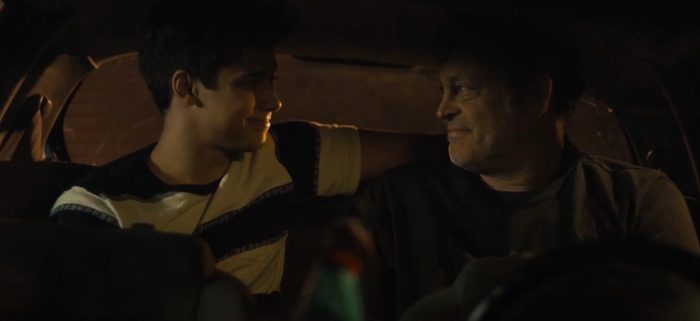
15. The Romantic Heart-to-Heart in Freaky
There's a lot to love about Freaky, the body-swap horror-comedy that's also the best slasher movie since Scream. But what I loved most about the film is how sweet and sincere it is. The film follows Millie (Kathryn Newton), a shy high school girl who is targeted by a serial killer, played by Vince Vaughn. As movie-fate would have it, the two end up swapping bodies – Newton's character ends up inhabiting Vaughn's body, while Vaughn's character is now walking around with Millie. Through a series of events, Millie – now in Vince Vaughn form – ropes her friends into helping her get her body back. Also along to help is Booker (Uriah Shelton), the nice guy Millie has a crush on. Late in the film, Booker and Millie (again, in Vince Vaughn form) end up in the back seat of a car, confessing their feelings for each other. On the surface, this scene could be played for cheap laughs: seeing Vince Vaughn flirting with a high school guy. But even though there is humor in the scene, the script, by Michael Kennedy and Christopher Landon, plays the scene for genuine emotion. It's cute, and charming, and, yes, sweet, and Vaughn and Shelton are both pitch-perfect in how they handle it. (Chris Evangelista)
14. Elizabeth Debicki is Tall in Tenet
Okay, this one sounds like a joke, and it kind of is. And yet, I mean it with the utmost sincerity! It can't be denied: Elizabeth Debicki is tall. She's 6'3", in fact. But Hollywood has a long history of hiding, or cheating, certain actor's heights. Tom Cruise might be the best example of this – Cruise is 5'7", and yet you'd never know that if you watch his movies. Be it through camera trickery, shoe lifts, or other methods, Cruise is often made to look the same height as his costars. And that's fine! I'm not judging people of a shorter stature here. But it genuinely feels like a big deal for a Hollywood movie to embrace a female lead who is not just tall, but also one who towers over her costars. While I think Tenet suffers on a script level by turning Debicki's character into a damsel-in-distress, Christopher Nolan and company deserve credit for letting her be tall, damn it! At one point, star John David Washington has to stand on his tip-toes just to give her a kiss on the cheek – I don't think I've ever seen a movie where the male lead has to do something like that to the female lead, especially not a big Hollywood blockbuster. Later, Debicki's character is handcuffed in the backseat of a speeding car with no driver, and she has to reach one of her long legs up to the front set to hit the door locks button with her foot. The film is flat-out flaunting Debicki's height. So whatever Tenet's flaws, let us all take comfort in the fact that it's a movie that allows very tall person Elizabeth Debicki to be very tall. (Chris Evangelista)
13. The Fireside Encounter in His House
There's something very wrong with Bol (Sope Dirisu) and Rial's (Wunmi Mosaku) new tenement house. The South Sudan refugees find themselves plagued by ghosts of Nyagak, their daughter who they lost in the treacherous crossing of the English channel, as well as a mysterious man who escapes into the walls. But it's not actually the house that is haunted, but them, as Rial realizes they're stalked by an apeth or "night witch" — a being that stalks thieves until they repay their debt. Rial insists that the only way to escape this curse is to return home, but Bol, in a fit of stubborn pride, summons the apeth himself by candelight. But Bol gets more than he bargained for, getting transported to a vision of a tragic night and forced by skeletal arms to watch as the apeth brings a dripping Nyagak out of the water and offers Bol a life-or-death deal. It's a striking image — a terrified Bol surrounded by corpses lying in the shallow body of water — and one that makes His House one of the most visually satisfying horror movies of last year. (Hoai-Tran Bui)
12. The Doctor Scene in Never Rarely Sometimes Always
Never Rarely Sometimes Always has one of the most harrowing, and emotionally stirring scenes of 2020. The story follows 17-year old Autumn Callahan (Sidney Flanigan) who learns she's pregnant and heads into New York City from Pennsylvania in order to get an abortion without her parents knowing. Before she has the procedure carried out, one of the doctors at the clinic has to carry out a questionnaire in order to provide the best possible care. These questions are meant to be responded to with four possible answers: never, rarely, sometimes, or always. Through this routine line of questions, we come to understand that Autumn has been through sexually, physically, and emotionally abusive relationships. There aren't any flashbacks or specific details provided, but in a single take, the camera focuses on Flanigan's face as she slowly begins to break down during her reflection on the answers to these questions. She quietly cries, tears streaming down her face, remembering what she's endured and presumably what brought her to the abortion clinic to begin with. It's a stark reminder of the kind of unacceptable treatment women receive from men, even at such a young age. (Ethan Anderton)
11. “The Elves Went Too Far!” in Eurovision Song Contest
Will Ferrell and Rachel McAdams makes for an outstanding comedic and musical duo in Netflix's comedy Eurovision Song Contest: A Song of Ice and Fire. As Icelandic singers Lars Erickssong and Sigrit Ericksdóttir, Ferrell and McAdams are vying to represent Iceland in Europe's massive, real-life singing contest. Unfortunately, they're not quite good enough. But they suddenly get the opportunity of a lifetime when the winning Icelandic candidate and the rest of the country's most talented singers perish in a freak yacht explosion. That moment is funny in itself, but it's Rachel McAdams who makes this moment one of the funniest events of the year when she laments that the elves that she prayed to for luck have gone too far with this incident. It has the same energy as McAdams' moment in Game Night where she celebrates and immediately mourns the death of a henchman who just tried to kill her before getting sucked into a plane engine, and we're still laughing about both of these gags. (Ethan Anderton)
10. The Opening Murder in Possessor
I saw Possessor at Sundance last year, and I'll never forget the overall vibe in that screening – particularly after the first scene. As is the case with most Sundance films, I knew very little about what I was getting into. I just knew the plot: Andrea Riseborough was playing an assassin who could upload her own consciousness into other people's bodies and have those bodies carry out her hits. And so the film begins, with the audience thrust into a situation they don't understand. A woman (Gabrielle Graham) is seen in some sort of great emotional duress. She eventually gets control of herself, almost too well, becoming almost robotic. And we follow the woman into a crowded room as she casually strides up to a man and brutally stabs him to death. The woman is, of course, "possessed" by Riseborough's character, and carrying out one of her jobs. But even if you guessed that's what was happening here, it doesn't prepare you for the horror on display. There's also a disturbing added layer: the possessed woman is Black, and when cops arrive on the scene they gun her down without blinking, even going so far as to put a bullet in her face when she's down. It's raw, gory, and unflinching, and immensely upsetting, and I could feel the jarring electricity coursing through the theater as it unfolded. Almost everyone was caught off guard, and there were murmurs and shocked gasps as the stabbing just kept going, producing torrents of realistic blood, leading to even ghastlier things. It's a horrifying introduction and it immediately sets the stage for the brutality to come. "Warning," this opening scene is telling us. "Things are only going to get more unpleasant." (Chris Evangelista)
9. The Freeport Heist(s) in Tenet
Let's give some serious props to Tenet, whose fractured narrative structure allows us to treat two scenes separated by an hour of screen time as a single sequence for the purpose of this list. Nothing is more Tenet-y than that. Early in the film, the Protagonist (John David Washington) and Neil (Robert Pattinson) plan a heist at a heavily-guarded freeport, hoping to learn about the time-inverting conspiracy to destroy the world. Their slick operation (which includes crashing an empty airplane into an empty building) goes smoothly...until they encounter resistance in the form of inverted, masked men, who are moving backwards through time as they move forward. Late in the film, both of our heroes must travel backwards through time themselves, returning to the scene of the heist and becoming the masked men they encountered while moving forward in time. It's an audacious action scene, one that only makes complete sense once it's told twice, from different perspectives, and from different trajectories in time itself. It's Tenet in a nutshell: ambitious, mind-bending, a little silly, and just plain satisfying to watch come together if you've given yourself over to Christopher Nolan's stylish lunacy. (Jacob Hall)
8. Nyles Gets One More Sentence in Palm Springs
Palm Springs is the best time loop movie ever made, not just because it's hilarious and sweet and unique, but because it's wise. Nyles (Andy Samberg) and Sarah (Cristin Milioti) have been trapped in a time loop at a boring hotel during a lousy wedding for a long time, spending their repeated days goofing off and hanging out and falling in love. But their relationship hits a rough patch. Sarah wants to escape the time loop and she's found a way out, but Nyles is reluctant, preferring the safety of his predictable world to any kind of future. But as Sarah heads out to set off the bomb that will literally explode her back into a proper timeline, Nyles has a change of heart. Sarah gives him one sentence to convince her that he loves her. And he does, via a rambling, awkward, hilarious "sentence" that breaks every grammatical rule on its way to the single best dialogue exchange of 2020. "What if we get sick of each other?" Sarah asks. "We're already sick of each other," Nyles says. "It's the best." Has there ever been a scene that more accurately captures the feeling of a lived-in, comfortable, lasting love? Nah. And here it is, the beating heart of this quietly incredible comedy. (Jacob Hall)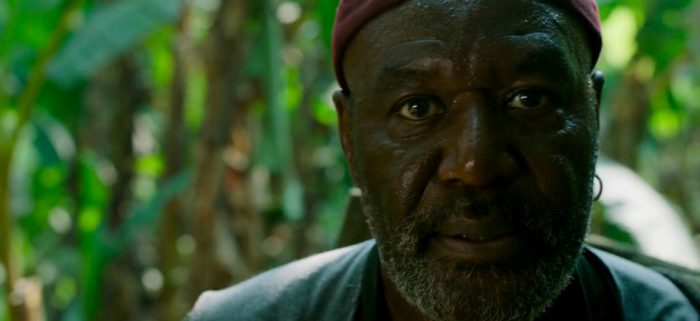
7. Paul’s Monologue Straight to the Camera in Da 5 Bloods
Spike Lee's Da 5 Bloods follows a group of former Vietnam War buddies who return to Vietnam in search of the remains of their dead commander – and some gold. They're a group of men haunted by their past, and none seem more haunted than Paul, played by Delroy Lindo. Violent, volatile, and suffering from PTSD, Paul is a damaged man, prone to outbursts against his friends and his son. He dons a MAGA hat, much to the chagrin of those around him, and as Da 5 Bloods progresses, he grows more and more unhinged. It all builds towards a moment when Paul, separated from the others, staggers through the jungle – and begins talking. Paul's fractured mindset makes us think he's just rambling incoherently to himself at first, but that changes fast as Lindo looks directly into the camera as he continues a monologue. His eyes are fixed on us as he speaks, sweat soaking his face. He reveals he's dying of cancer – "You made me malignant," he practically spits. He blames Agent Orange – a tactical herbicide used during the war – for his terminal illness, and it's impossible to not draw a connection between that and Paul's embracing of the MAGA philosophy (if you want to call it that). Agent Orange is Lee's mocking pet name for Donald Trump – it even comes up in the film – and to hear Paul blame "Agent Orange" for something that's eating him up inside is apt. But he refuses to give in. He refuses to die. "I will choose when, and how, I die," he tells us. It's haunting, and Lindo's performance burns up the screen as we're forced to make eye contact with him the entire time. Lindo is an actor who has been delivering phenomenal work for years, but his performance in this film – and this scene in particular – is seismic. You can feel the ground shift beneath you as you watch. (Chris Evangelista)
6. The Healing Scene in Wolfwalkers
Wolfwalkers is a miracle of an animated movie: a glorious showcase of Cartoon Saloon's groundbreaking animated art, and a deeply emotional story that manages to awe and inspire. The harmony between those elements reaches a crescendo in the climactic healing scene toward the end of the film, in which the wild Wolfwalker child Mebh (Eva Whittaker) is finally reunited with her mother Moll (Maria Doyle Kennedy), only for Moll to be fatally wounded after being shot in the chest in wolf form. Mebh, so fierce and outrageous until now, is reduced to a tearful lost child at the sight of her dying mother, for whom she had waited hopefully for months, and struggles to heal her with her wolf magic from the safety of their den while a fiery battle is being waged outside. As if the emotions couldn't be high enough, the animators outdo themselves in matching the art with the intense frenzy of the scene, beams of light dancing around the screen and lighting up the mystical cave drawings as Mebh gathers the wolves to help heal her mother. The sheer agony of Mebh's desperation, combined with the sheer artistry used to depict her magic (the wisps of light at one point lighting up a drawing of a child embraced by a mother in a beautiful piece of detailing) is nothing short of breathtaking. (Hoai-Tran Bui)
5. The Final Scene in Sound of Metal
For much of Sound of Metal, Ruben (Riz Ahmed), a heavy metal musician and former addict who suddenly finds himself deaf, cannot bear silence. He rages against it, rebels against it, feels the need to compulsively fill it up with anything. We see from the beginning of Darius Marder's stunning directorial debut that Ruben is a man of intense physicality, whether it be waking up early every morning to squeeze in a quick workout routine in his and his girlfriend Lou's (Olivia Cookie) shabby RV while making breakfast, or attempting to do busywork while he's living at the community for deaf recovering addicts. The community's founder, Joe (Paul Raci), notices this restlessness in Ruben and attempts to help him learn to embrace the silence by allowing Ruben a room to sit every morning and get all of his anger out. But even as Ruben learns to be deaf and even becomes a beloved member of the deaf community, his restlessness never wanes but is focused elsewhere — he's still trying to keep busy, still working toward something. And he never does sit quietly in that room. But after Ruben has his cochlear implant surgery and has reunited with Lou, he finds that his dream of regaining his hearing is only a discordant echo of what it used to be. He leaves Lou's house to wander the streets of Paris, followed by the barrage of tinny street sounds all around him. It is not until that final scene when Ruben sits down on a bench and disconnects the implants, the loud world falling under a soft, pillowy quiet, does he learn to finally love the silence. (Hoai-Tran Bui)
4. Fern Glues Her Broken Plates Back Together in Nomadland
Fern (Frances McDormand) is a middle-aged woman who, after losing her husband and her job thanks to the economic crisis, lives her life out of her van, driving around the country from job to job. Among her most prized possessions are a collection of plates given to her by her father, which she keeps with her in the van during her travels. At one point during Nomadland, the plates are accidentally shattered – and for a moment, it seems like Fran could be, too. But she refuses to let this be an obstacle: in the very next scene, she's quietly and methodically gluing those plates back together. It's a small moment that serves as a wonderful metaphor for the resilience and grit exhibited in that nomadic community, and a grace note that makes Nomadland one of /Film's collective favorite films of the year. (Ben Pearson)
3. The Restaurant Scene in The Invisible Man
This is the scene that takes The Invisible Man from a very good movie to a great one. Everything up to this point in Leigh Whannell's brilliant #MeToo horror movie works like gangbusters, but it's this scene in particular that solidifies the amazing work Whannell is doing. The set-up: Cecilia Kass (Elisabeth Moss) is being tormented by her boyfriend – a scientist who has found a way to turn himself invisible. Everyone else thinks the man is dead, and Cecilia's instance that he's not is alienating everyone around her. Even Cecilia's own family turns against her – a move that's exacerbated when the Invisible Man himself hacks Cecilia's email and sends her sister Emily (Harriet Dyer) a nasty letter. Later, after finding proof that she's right, Cecilia begs her sister to meet her somewhere so she can tell her what's really going on. Emily reluctantly agrees, and she and Cecilia meet up at a posh restaurant. Right away, Whannell is disarming us – the restaurant is crowded and well-lit, and it's hard to imagine anything bad happening here. Whannell continues to disarm us by introducing a comic relief water, the type who can't shut up about the specials. Our guard is lowered. We're amused by the waiter, and by Emily's droll dismissal of him. And we're just waiting for the moment where Cecilia finally tells Emily what's going on. But she never gets the chance. We see Emily react to something offscreen, a puzzled look on her face – and then Whannell cuts to another angle where we see a knife floating in mid-air. In one quick swoosh, the knife slices across Emily's throat, killing her in the process. It's shocking as hell and perfectly constructed – we've been so distracted by everything else going on in the scene that we're completely unprepared. Just like Emily and Cecilia. (Chris Evangelista)
2. Ruben is Asked to Leave the House in Sound of Metal
Here it is. The most emotionally devastating movie moment of 2020. Sound of Metal follows Ruben (Riz Ahmed), a musician who loses his hearing and finds himself forced to reckon with a life utterly unlike the one he used to live. But the initial pain transforms into one of beauty. And even bliss. We watch as Ruben learns how to be deaf, attending classes for those with hearing disabilities, learning sign language, and living in a house overseen by the tough-but-kind Joe (Paul Raci), who insists that Ruben, like all other deaf people, is not broken. But Ruben still yearns for his old life and sneaks away, selling his RV to pay for cochlear implant surgery. When he reveals what he's done, Joe is stunned. Hurt. He has spent so much time teaching Ruben that there is nothing wrong with him, that everyone in his house is a complete person, even without their hearing. Through tears, he asks Ruben to leave the house immediately. He bears no hatred for Ruben, nor for his choice to get the implant, but recognizes that his choice conflicts with everything he stands for. He loves him, but they cannot coexist after this. It's a challenging scene – the film doesn't judge Ruben for his choice, allowing other characters to express a variety of opinions over his actions – but it's clear as day why it destroys Joe. And Raci and Ahmed, giving the two best performances of 2020, let all of that pain transfer under our skin. We feel Ruben's shame and Joe's disappointment so vividly that we might as well be sitting in that room. (Jacob Hall)
1. Joe After the Show – and a New Perspective in Soul
In Pixar's Soul, Joe Gardner (Jamie Foxx) is a middle school band teacher who wants nothing more than to be professional jazz musician. When he finally gets the opportunity he's been waiting for with a famed touring jazz group – after going through The Great Beyond and The Great Before to get there – he comes away not being nearly as satisfied as he thought he'd be. Joe realizes that he's driven the young soul 22 in the wrong direction by making her think that the spark she needs to complete her personality should be something that gives her life purpose. This helps Joe to realize that just because he didn't achieve his dreams doesn't mean he can't have a fulfilling life. Joe might love jazz with a fierce passion, but it might have also kept him from truly living. By the end of the movie, Joe doesn't know what direction his life will take, but he knows that it will be one worth living. Once this nightmare of a pandemic is over, that's exactly what we all should be striving for everyday. (Ethan Anderton)

